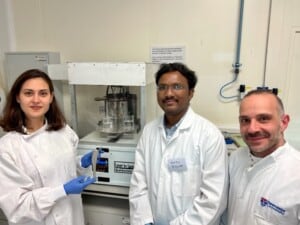Research Impact Report - Project 536
Antibacterial coating via hybrid Layer-by-Layer deposition system for fighting infections in orthopaedic implants
Principal Investigator Ana Ferreira-Duarte
Stream Post-Doc
Duration 24 Months
Cost £90,000
Lay summary
Orthopaedic implants are highly susceptible to infection, and the resistance of bacteria to antibiotics is a dangerous issue in post-orthopaedic surgical implantation. Orthopaedic implant infections remain a challenging issue in patients with potentially life-threatening complications, with a known mortality approaching 8% in the elderly. Averagely, 2-5% of implants are estimated to be infected and up to £11 million are spent yearly for the treatment and management of implant-associated infections. Currently, there is no treatment available that might guarantee efficiency when it comes to biofilm prevention and eradication. Therefore, there is an urgent need for developing effective strategies to minimise the risk of infections, and long-term success depends on the antibacterial properties of the implants.
Surface implant modification is a timely and promising strategy to provide an antimicrobial character for decreasing infection occurrence. Our goal is to create innovative and smart multi-layered coatings onto the implants surface capable to prevent the striking ability of bacteria to quickly adhere on a substrate and immediately produce a protective biofilm barrier. Our proposed Layer-by-Layer (LbL) assembly technology presents a versatile method to modify the surface properties, control cell interaction and enhance biological functions by incorporating biomolecules in a Layer-by-Layer manner to control their release from the alternate charged nanolayers. The multifunctional coatings based on naturally derived materials like collagen, hyaluronic acid, bacterial-killer peptides, and honey derived compounds will offer an effective solution to address implants infections, while enhancing bone regeneration. The development of a new generation of antibacterial coated implants will improve the quality of patients’ life by minimising the risk of infections and associated painful musculoskeletal conditions with an increase in the long-term success of the surgery.
Impact statement
- Patients with weakened immune systems and prone to nosocomial infections will be the main beneficiaries of this technology, the NHS by reducing associated healthcare costs.
- The proposed research tackles existing challenges and complications caused by bacterial infections of orthopaedic implants during surgical procedures.
- The project goal is to create innovative Layer-by-Layer coatings in a controlled and cost-effective manner for fighting infections in orthopaedic implants
- For this, we exploit our patented Hybrid Layer-by-Layer technology for the manufacturing of tunable coatings to control the release of biomolecules at nanoscale by alternating charged compounds combining dipping and spraying deposition methods
Our multidisciplinary team, composed of academics, clinic, and industry partner, will work in synergy towards accelerating the innovation process and discoveries of developed Layer-by-Layer antibacterial coatings on implants by focusing on patients’ real needs and improving their quality of life.
Fundamental problem trying to address
Most of the infections in orthopaedics implants are related to Staphylococcus aureus (34%) and Staphylococcus epidermidis (32%) bacteria, which can be generated under multiple conditions including the implantation of a new device within the host. Within 1 year of primary Total Hip Arthroplasty, 8% of patients who underwent a revision for prosthetic joint infection died.
Therefore, this project arises from existing clinical needs, which concerns that
- On average, 2-5% of implants are estimated to be nosocomial contaminated
- Just in the UK, up to £11 million are spent yearly for treating and managing implant bacterial infections
- There is no effective treatment to prevent and eradicate biofilm
With the increasing of the aging population and antimicrobial resistance globally, there is an urgent need for medical devices and technologies that can effectively prevent the onset of painful surgical complications by managing early stages of biofilm formation while treating existing orthopedic related diseases.
Aims & Objectives
Our project aims to create innovative functional multi-layered coatings by incorporating nano-features and antibacterial agents within the implant surface coating in a controlled and cost-effective manner for clinical applications. Two main objectives are identified:
Objective-1: to develop a new generation of bactericidal coating for orthopaedic implants by tuning the antibacterial agents’ release in a controlled manner, minimising the risk of infections by preventing and eradicating biofilm formation on implants, while promoting cellular interaction
Objective-2: to develop in synergy with Zimmer Biomet, implant surfaces with effective antibacterial properties, capable of diminishing infection occurrence and manufactured with the feasible cost at industrial scale.
Intellectual property
This project will exploit our patented hybrid Layer-by-Layer apparatus (PCT/GB2020/052641) for developing the nano-coatings with a reduced overall time of their manufacturing, in synergy with Zimmer Biomet. The designed nano-coatings are designed for high stability and controlled antimicrobial molecules release, which offers an opportunity for new products that minimise the risk of infection and increase the chance of the long-term success of the surgery. At the end of this project, we will assess the commercial potential of the research developed within this project (e.g. antibacterial materials and nano-coatings) jointly with our TTO team at NU, assisting in identifying potential IP arising from this project and routes to market
Team members & other funders
- Ana Ferreira Duarte (Principal Investigator)
- Piergiorgio Gentile (Co-Principal Investigator)
- Anjaneyulu Udduttula (Research Associate)
- Nick Jakubovics (Microbiologist Advisory member)
- Kenneth Rankin (Orthopaedics Clinical advisory member)
- Imran Khan (Head of the Research and Development, Zimmer-Biomet)
Publications
Layer-by-Layer assembly of ECM based biological macromolecules onto Ti alloy for tackling related bone implant infections. 32nd Annual Conference of the European Society of Biomaterials (2022), France




Tell us your thoughts